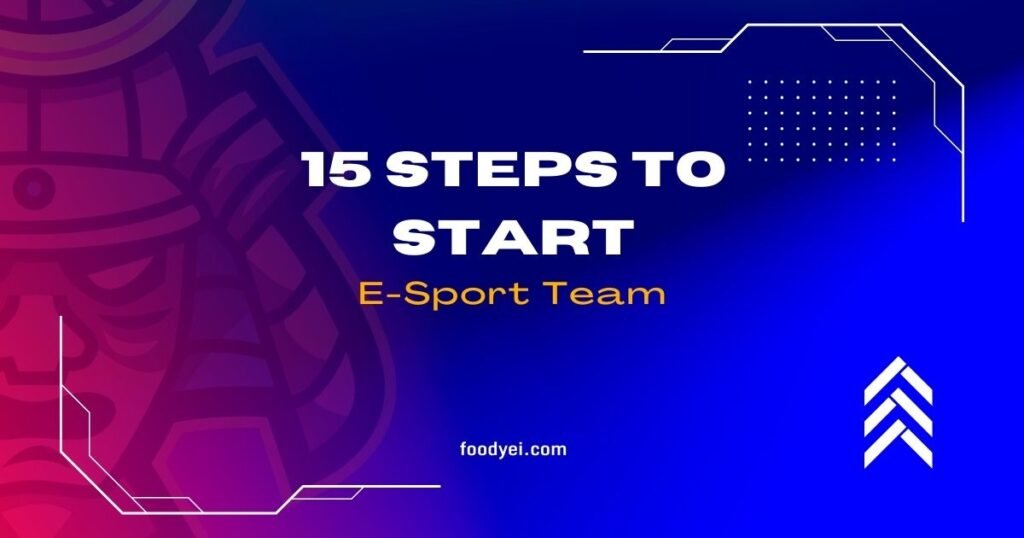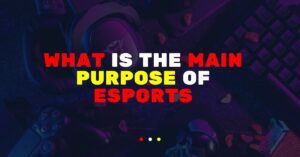Over the past few years, interest in competitive video gaming, often known as esports, has increased dramatically. Starting an esports team has grown to be an intriguing business endeavor for gamers, and investors equally because of the millions of followers and massive prize amounts. We will guide you through the necessary considerations and actions if you possess a love for gaming and want to start your own esports team. We will go through everything you need to know to get started, from developing a great roster to creating a brand.
15 Steps to Start an Esports Team

Understanding the Esports Landscape
It’s essential to comprehend the esports scene before beginning the process of forming an esports team. Familiarize yourself with different game genres, popular esports titles, prominent teams, and major tournaments. Gain insights into the fan base, demographics, and trends within the industry. This knowledge will help you make informed decisions and navigate the competitive gaming space effectively.
Setting Goals and Objectives
Define the goals and objectives for your esports team. Determine the game or games you want to compete in, the level of competition you aim to reach, and the target audience you want to engage with. Establishing clear goals will provide direction and focus as you move forward.
Assembling Your Team
To build a successful esports team, recruit skilled players who excel in the chosen game. Look for individuals who demonstrate not only exceptional gaming abilities but also good teamwork, communication, and sportsmanship. Conduct tryouts, evaluate player performances, and select those who align with your team’s vision and values.
Establishing a Brand Identity
Creating a strong brand identity is crucial for the long-term success of your esports team. Develop a memorable team name, logo, and color scheme that resonate with your target audience. Craft a unique brand story and mission statement that sets your team apart from the competition. Consistently reinforce your brand identity in all team communications and marketing efforts.
Creating a Training Infrastructure
Provide your players with the necessary tools and resources to enhance their skills and performance. Set up a dedicated gaming space equipped with high-quality gaming gear and reliable internet connectivity. Establish a training schedule and implement coaching and mentoring programs to help players improve their gameplay.
Engaging in Competitions
Participating in tournaments and competitions is essential for gaining exposure and establishing your team’s reputation. Register for both online and offline tournaments, ranging from small local events to larger regional or international competitions. Consistently perform well and showcase your team’s talent to attract sponsors and fans.
Developing Sponsorship and Funding Strategies
Securing sponsorships and funding is vital for the financial sustainability of your esports team. Create a comprehensive sponsorship proposal highlighting the value and exposure you can offer to potential sponsors. Explore partnerships with gaming-related brands, technology companies, and other organizations interested in reaching the esports audience.
Building a Strong Online Presence
In the digital age, having a strong online presence is crucial for any esports team. Create a professional website that showcases your team’s achievements, player profiles, and upcoming events. Establish active social media accounts on platforms like Twitter, Instagram, and Twitch to engage with fans, share updates, and live stream matches.

Engaging with the Gaming Community
Actively engage with the gaming community to expand your network and connect with potential fans, players, and sponsors. Attend gaming conventions, host community events, and collaborate with popular streamers and content creators. Building strong relationships within the gaming community can significantly boost your team’s visibility and opportunities.
Managing Team Logistics
Ensure effective management of team logistics, including travel arrangements, accommodation, and tournament registrations. Designate a team manager or coordinator responsible for organizing schedules, logistics, and communication between players, coaches, and support staff. Efficient management allows your team to focus on their performance without unnecessary distractions.
Handling Contracts and Legalities
When entering into agreements with players, sponsors, or partners, it’s essential to have proper contracts and legal documentation in place. Consult with a legal professional experienced in esports to ensure compliance with relevant laws and protect the interests of all parties involved.
Balancing Player Welfare and Performance
Player welfare is paramount for maintaining a healthy and successful esports team. Encourage players to adopt a balanced lifestyle, including regular exercise, proper nutrition, and sufficient rest. Provide access to mental health support and create an environment that prioritizes well-being alongside competitive performance.
Continuous Improvement and Adaptation
Esports is an ever-evolving industry, and staying ahead of the curve is essential. Encourage a culture of continuous improvement within your team. Analyze gameplay data, study strategies employed by other successful teams, and adapt your training methods accordingly. Embrace new technologies and trends that can give your team a competitive edge.
Evaluating Success and Growth
Regularly assess your team’s performance and progress towards the goals you set. Analyze tournament results, viewership metrics, and feedback from sponsors and fans. Identify areas for improvement and strategize accordingly. Celebrate achievements and milestones, reinforcing team morale and motivation.
Conclusion
Starting an esports team is an exciting journey that requires dedication, strategic thinking, and a passion for gaming. By understanding the esports landscape, building a talented team, establishing a strong brand, and engaging with the community, you can position your team for success. Remember to continuously adapt, strive for improvement, and prioritize the welfare of your players. With persistence and perseverance, your esports team can thrive in this ever-growing industry.
FAQs
How much does it cost to start an esports team?
The cost of starting an esports team can vary widely depending on factors such as player salaries, travel expenses, equipment costs, and marketing investments. It’s essential to create a detailed budget and secure sponsorships or funding to support your team’s operations.
Do I need to be a professional gamer to start an esports team?
While having a background in professional gaming can be advantageous, it’s not a requirement to start an esports team. However, a deep understanding and passion for esports, along with effective team management skills, are crucial for success.
How can I attract sponsors to support my esports team?
To attract sponsors, emphasize the value and exposure your team can offer. Develop a compelling sponsorship proposal, showcase your team’s achievements and potential, and demonstrate how partnering with your team can benefit the sponsors’ brand and target audience.
What are some popular games for esports teams?
Popular games for esports teams include titles such as League of Legends, Dota 2, Counter-Strike: Global Offensive, Overwatch, and Fortnite. However, the popularity of games can change over time, so it’s important to stay informed about emerging titles and trends.
How can I grow my team’s fan base?
Growing your team’s fan base requires consistent engagement with the gaming community. Actively interact on social media, stream matches and content regularly, collaborate with influencers, and organize community events. Building a strong brand and providing exciting gameplay are key to attracting and retaining fans.




